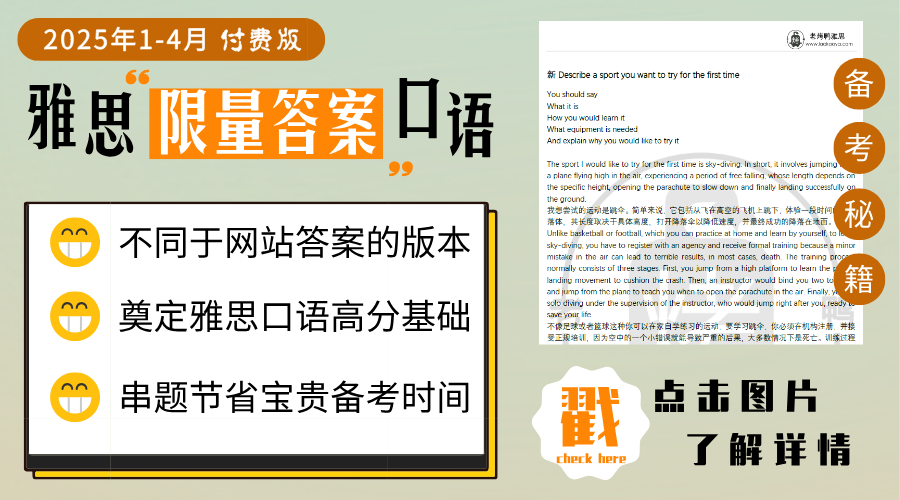剑桥雅思5 test 1 Section 4听力原文与答案 saving for the future
该部分前5道题目和后5道题目的难度差异非常大。前面太过简单,要低于目前正常考试Section 4的水平,后面难度又太大,要高于正常Section 4的水平。后5道题目中,除了39和40之外,其他三道题都非常容易犯错,不仅句子关键词不明朗,不容易定位,而且空前后词的提示也十分弱,让人不知道答案究竟是哪个。如果大家这三道题目全对,基本就具备了雅思听力7分以上的实力。
点击查看这篇雅思听力中需要大家掌握的高频词汇与具体题目的答案解析:
雅思备考听力篇 剑5 test 1 section 4 雅思听力高频词汇
剑桥雅思5 Test 1听力Section 4答案解析 saving for the future
剑5 test 1 Section 4雅思听力原文
OK, so we’ve been looking at the attitudes of various social and cultural groups towards the management of their personal finances – how important they feel it is to save money, and what they save their money for. One aspect that we haven’t yet considered is gender. So if we consider gender issues we’re basically asking whether men and women have different attitudes towards saving money, and whether they save money for different things.
Back in 1928 the British writer George Bernard Shaw wrote in his Intelligent Women’s Guide to Socialism and Capitalism that ‘A man is supposed to understand politics, economics, and finance and is, therefore, unwilling to accept essential instruction.’ He also said, ‘A woman, having fewer pretensions, is far more willing to learn’. Now, though these days people might question a lot of the assumptions contained in those statements, recent research does suggest that there are some quite fundamental differences between men and women in their attitudes to economic matters. Q31, Q32
Let’s look at what men and women actually save for. Research studies of women in North America have found that women are far more likely to save for their children’s education and they are also more likely to save up in order to buy a house one day. The same studies have found that men, on the other hand, tend to save for a car, which by the way takes a surprisingly large amount of the household budget in North America. But the other main priority for men when saving money is their retirement. When they’re earning, they’re far more likely to put money aside for their old age than women are. Q33, Q34
Now, this is rather disturbing because in fact, the need for women to save for their old age is far greater than for men. Let’s consider this for a moment. To start with, it is a fact that throughout the world, women are likely to live many years longer than men, so they need money to support them during this time. Since women are likely to be the ones left without a partner in old age, they may, therefore, have to pay for nursing care, because they don’t have a spouse to look after them. Furthermore, the high divorce rates in North America are creating a poverty cycle for women. It is the divorced women who will most often have to look after the children and thus they need more money to look after not just themselves but others. Q35
So what can be done about this situation? The population in North America is likely to contain an increasing number of elderly women. The research indicates that at present for women it takes a crisis to make them think about their future financial situation. Q36
But of course, this is the very worst time for anyone to make important decisions. Women today need to look ahead, think ahead – not wait until they’re under pressure. Even women in their early twenties need to think about pensions, for example, and with increasing numbers of women in professional positions, there are signs that this is beginning to happen. Then research also suggests that women avoid dealing effectively with their economic situation because of a lack of confidence. The best way for them to overcome this is by getting themselves properly informed so they are less dependent on other people’s advice. A number of initiatives have been set up to help them do this. This College, for example, is one of the educational institutions which offers night classes in Money Management, and increasing numbers of women are enrolling in such courses. Here, they can be given advice on different ways of saving. Many women are unwilling to invest in stocks and shares, for instance, but these can be extremely profitable. It is usually advised that at least 70% of a person’s savings should be in low-risk investments but for the rest, financial advisors often advise taking some well-informed risks. Initiatives such as this can give women the economic skills and knowledge they need for a comfortable, independent retirement. Q37, Q38, Q39, Q40
The increasing proportion of elderly women in the population is likely to have other economic consequences …
剑5 test 1 Section 4雅思听力答案
31. politics 政治
32. learn 学习
33. children’s education 儿童教育
34. a car 一辆车
35. nursing care 护理
36. crisis 危机
37. early twenties 20年代初期
38. confidence 自信心
39. money management 财务管理
40. low-risk investment 低风险投资


